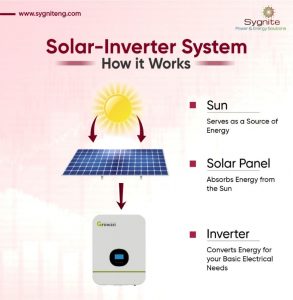Reduce Money spent on Electricity; Get Solar Panels
A Solar Panel is a device that converts solar energy from the Sun to electrical energy. A typical commercially available solar panel is made from silicon, a hard and brittle crystalline substance. Solar panels consist of cells which are made out of silicon wafers. These cells, called Photovoltaic Cells (also known as PV cells or solar cells) absorb energy from sun rays and convert it to direct current which can then be converted by an inverter, stored in a battery and deliver power to appliances in a home or business.
One of the main objectives of any solar manufacturer is efficiency—how much of the sunlight that falls on every square meter of the solar panel can be converted into electricity. A Solar panel can last 10 to 30 years, depending on type and/or terrain where it is used.
The diagram below illustrates how solar panels work
Types of Solar Panels
There are basically two types of Solar panels. These are:
1.Monocrystalline Solar Panels
2.Polycrystalline Solar Panels
Monocrystalline Solar Panels are usually black and are the most popular in the market. They are ideal for areas that have low amount of sun light- places like Lagos, Jos. The cells are made from a single continuous Silicon crystal hence the name. They are more appealing to the eye and have better efficiency.
Polycrystalline Solar Panels consists of solar cells made from multiple crystals of
Silicon. They are usually blue and are cheaper than monocrystalline solar panels and work best in areas with high amount of sunlight- places like Abuja, Sokoto, Kano. They have a better temperature tolerance than monocrystalline panels.
This means that a polycrystalline solar panel will handle temperature fluctuations better. However, because they are less efficient, you will need a bigger poly panel to match the power output of a monocrystalline solar panel.
Solar Panel Features
A Solar panel is rated by its output voltage and power. However, the output voltage is just nominal as actual output voltage will vary depending on the intensity of sunlight. So, it is possible for a solar panel rated 12V to end-up generating 18V or even more. The maximum current is also usually listed. Examples of commercially available Solar panels with different power outputs are 80W, 100W, 150W, 200W, 250W, 300W, 350W and so on. Usually you will have to connect a number of solar panels in series and/or parallel to deliver the required voltage for the inverter and power required to power your appliances. Another feature to consider is the efficiency of the solar panel. Usually, this ranges between 7% to 24%. This figure tells how sensitive the solar panel is to light. A
high number is always good as it means you can get more output from a smaller panel saving space.To ensure you take a good advantage of the efficiency of your solar panel, it is a good idea to tilt your solar panel assembly to the same latitude as your installation address.You can also install the solar panel with a solar tracker that will automatically tilt the solar panel depending on the angle of the Sun ensuring you catch the highest amount of sunlight irrespective of the time of day. However, such an installation is complicated, costs a lot, and requires frequent maintenance.
A Solar panel can last between 10 and 25 years, however it degrades over time. For example, a solar panel could offer 10 years at 90% of rated power, 20 years at 85% rated power, and 25 years at 80% rated power. This means that if you bought a 200W panel with the degradation rating stated above the panel will offer 180W after 10 years, 170W after 20 years, and 160W after 25 years. Degradation can also be rated in percentage degradation per year. e.g. 1% per year, 1.5% per year, or 2% per year. At Sygnite, we have world class solar-inverter systems that can provide you with 24/7 power supply. The system comprises of; solar panel, inverter, and batteries.
To enjoy 24/7 power supply, follow this link https://sygniteng.com/packages to see a range of our products. We can also be reached via phone calls on: +234 808 307 3047 and +234 907 252 6689 and WhatsApp: +234 808 307 3047.







